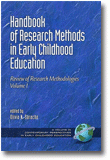
Handbook of Research Methods in Early Childhood Education - Volume I
Research Methodologies
Edited by:
Olivia Saracho, University of Maryland
A volume in the series: Contemporary Perspectives in Early Childhood Education. Editor(s): Olivia Saracho, University of Maryland.
Published 2014
The Handbook of Research Methods in Early Childhood Education brings together in one source research techniques that researchers can use to collect data for studies that contribute to the knowledge in early childhood education. To conduct valid and reliable studies, researchers need to be knowledgeable about numerous research methodologies.
The Handbook primarily addresses the researchers, scholars, and graduate or advanced undergraduate students who are preparing to conduct research in early childhood education. It provides them with the intellectual resources that will help them join the cadre of early childhood education researchers and scholars. The purpose of the Handbook is to prepare and guide researchers to achieve a high level of competence and sophistication, to avoid past mistakes, and to benefit from the best researchers in the field. This Handbook is also useful to university professors who conduct research and prepare student researchers in early childhood education. It aims to improve the researchers’ conceptual and methodological abilities in early childhood education. Thus, the Handbook can be used as a guide that focuses on important contemporary research methodologies in early childhood education and describes them to offer researchers the necessary information to use these methodologies appropriately.
This Handbook is designed to be used by students of early childhood education at all levels of professional development as well as mature scholars who want to conduct research in areas needing more in-depth study. It is hoped that this Handbook of Research Methods in Early Childhood Education will serve the needs of many in the research community. Scholars seeking the current state of research knowledge in various areas should find this volume useful. Similarly, practitioners who are trying to seek knowledge of research and its practical implications should find this volume helpful as well. This Handbook with its individual chapters presents several research methodologies to address a variety of hypotheses or research questions that will contribute to the knowledge of the field in early childhood education.
CONTENTS
Research Methodologies for Studying Young Children, Olivia N. Saracho. Part I: Systematic Research Methodologies. Using Peer Sociometrics and Behavioral Nominations With Young Children, Heidi Gazelle, Richard A. Faldowski, and Divya Peter. Sociometric Measures for Peer Relations Research With Young Children, Rosanne Burton Smith. Using Q Methodology in Conducting Research With Young Children, Aesha John, Diane Montgomery, and Amy L. Halliburton Tate. Q-Methodology and Q-sorting as Tools for
Addressing Research Questions in Educational Settings: Historical Overview and Illustrations Using Three Standardized Q-Sets, Brian E. Vaughn, António J. Santos, and Gabrielle Coppola. The Delphi Process, Ian P. Sinha and Olivia N. Saracho. Using the Critical Incident Technique in Early Childhood Research, Beth S. Rous. Utility of Implementation and Intervention Performance Checklists for Conducting Research in Early Childhood Education, Carl J. Dunst, Carol M. Trivette, and Melinda Raab. Ethical, Narrative, and Projective Processes in Research Interviews With Young Children, Helen L. Cameron. Story Completion Play Narrative Methods for Preschool Children, Shira Yuval-Adler and David Oppenheim. Using Mixed Methods in Research With Young Children Across Cultures and Contexts, Linda Liebenberg and Michael Ungar. Part II: Qualitative Research Methodologies. Grounded Theory, Robert Thornberg, Lisa M. Perhamus, and Kathy Charmaz. Conducting Early Childhood Qualitative Research in the Twenty-First Century, J. Amos Hatch and Chonika Coleman-King. Innovative Qualitative Research Methods With Children Aged 4–7 Years, Karen Winter. Case Study Research: The Child in Context, Susan Hill and Ngaire Millar. Action Research With Children, Kylie Smith. Microethnographic Research in Early Childhood Education, John A. Sutterby. Preschoolers’ Selective Learning From Adults: Lessons for Research Methods in Early Childhood Education, Kathleen H. Corriveau and Julie Dwyer. Conducting Historical Research in Early Childhood Education, Sue C. Wortham. Past As Prologue: Doing Historical Research in Early Childhood Education, Edna Runnels Ranck. Part III: The Research Process: From Conceptualization to Publication. Methods for Developing Scientific Education: Research-Based Development of Practices, Pedagogies, Programs, and Policies, Douglas H. Clements and Julie Sarama. Re-Examining the Literature Review: Purposes, Approaches, and Issues, Mary Renck Jalongo and Kelly Heider. Reading and Interpreting Early Childhood Research, Angela C. Baum and Paula McMurray-Schwarz. Elements in Writing Scientific Research Publications, Olivia N. Saracho. Writing for Publication on Research with Young Children, Nancy Dixon. About the Contributors.
-
Paperback9781623966102
Web price: $74.28 (Reg. 87.39)
-
Hardcover9781623966119
Web price: $123.16 (Reg. 144.89)
- eBook9781623966126

-
 Contemporary Perspectives on Research in Assessment and Evaluation in Early Childhood Education
Contemporary Perspectives on Research in Assessment and Evaluation in Early Childhood Education
-
 Contemporary Perspectives on Research in Motivation in Early Childhood Education
Contemporary Perspectives on Research in Motivation in Early Childhood Education
-
 Contemporary Perspectives on Research on Bullying and Victimization in Early Childhood Education
Contemporary Perspectives on Research on Bullying and Victimization in Early Childhood Education
-
 Contemporary Perspectives on Research on Child Care in Early Childhood Education
Contemporary Perspectives on Research on Child Care in Early Childhood Education
-
 Contemporary Perspectives on Research on Child Development Laboratory Schools in Early Childhood Education
Contemporary Perspectives on Research on Child Development Laboratory Schools in Early Childhood Education
-
 Contemporary Perspectives on Research on Coronavirus Disease 2019 (COVID-19) in Early Childhood Education
Contemporary Perspectives on Research on Coronavirus Disease 2019 (COVID-19) in Early Childhood Education
-
 Contemporary Perspectives on Research on Immigration in Early Childhood Education
Contemporary Perspectives on Research on Immigration in Early Childhood Education

